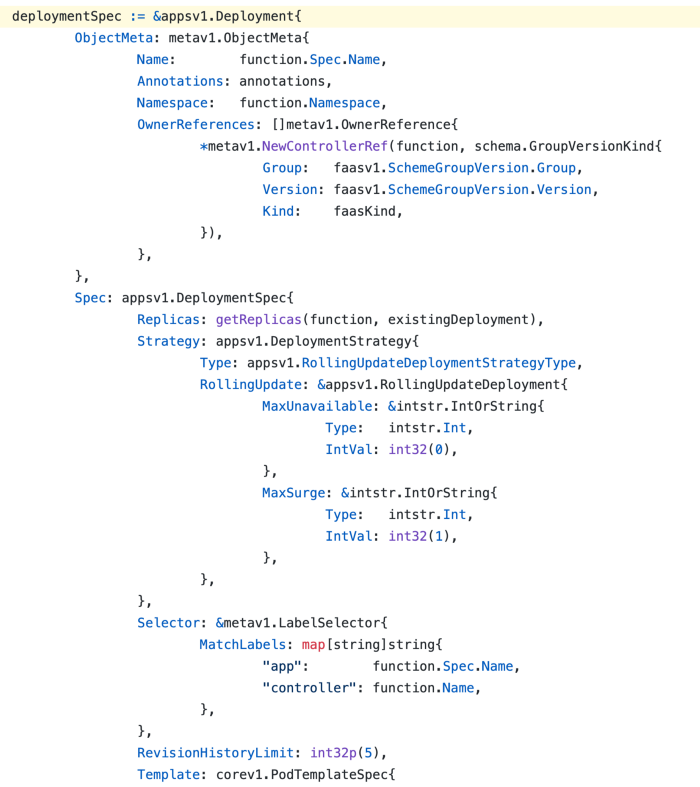Si vous avez utilisé des versions précédentes de Kubernetes - la même version 1.16 - vous avez peut-être vu un étrange avertissement de kubectl run.
Jusqu'à récemment, cette commande pouvait générer des objets pour le déploiement ou YAML à partir de la ligne de commande. Depuis Kubernetes 1.18, cette fonctionnalité a été interrompue de manière très surprenante. L'article répondra aux questions "Pourquoi?" et "Comment vivre avec cela plus loin?"

Avant de plonger plus profondément dans ces questions, rappelez-vous qu'il existe trois manières principales de créer des objets à déployer dans Kubernetes:
- Via l'API (comme le fait, par exemple, OpenFaaS)
- En créant manuellement un fichier YAML. Ou plus proche de la réalité - copiez-collez-y de quelque part à partir de différents sites (bonjour, StackOverflow)
- En lançant
kubectl runoukubectl run -o yaml --dry-run
Comme vous pouvez le voir, j'ai également répertorié les options par ordre de complexité (de difficile à simple).
Comparer les options
, API — , . API «extensions/v1beta», «apps/v1», YAML. , — Go YAML. Go IDE, , . Core? Meta? Apps? Extensions? , — Intellisense?

OpenFaaS Kubernetes (aka faas-netes)
— YAML . Twitter #kubernetes, , , , Kubernetes, , YAML.
, , , - , . , API Kubernetes.
apiVersion: apps/v1
kind: Deployment
metadata:
name: nginx-1
labels:
app: nginx
spec:
replicas: 1
selector:
matchLabels:
app: nginx
template:
metadata:
labels:
app: nginx
spec:
containers:
- name: nginx
image: nginx:1.14.2
ports:
- containerPort: 80Kubernetes, . , .
Kubernetes YAML , (, , . ).
:
- ;
- ;
- YAML ;
- CI\CD.
, , , :
$ kubectl run nginx-1 --image=nginx --port=80 --restart=Always, — YAML , . , ?
$ kubectl run nginx-1 --image=nginx:1.14.2 --port=80 \
--restart=Always -o yaml --dry-run
apiVersion: apps/v1
kind: Deployment
metadata:
creationTimestamp: null
labels:
run: nginx-1
name: nginx-1
spec:
replicas: 1
selector:
matchLabels:
run: nginx-1
strategy: {}
template:
metadata:
creationTimestamp: null
labels:
run: nginx-1
spec:
containers:
- image: nginx:1.14.2
name: nginx-1
ports:
- containerPort: 80
resources: {} , --replicas --serviceaccount. .
— , , Kubernetes 1.18 .
, , .
, : «, , »
$ kubectl run nginx-1 --image=nginx --port=80 --restart=Always
kubectl run --generator=deployment/apps.v1 is DEPRECATED and will be removed in a future version. Use kubectl run --generator=run-pod/v1 or kubectl create instead.
deployment.apps/nginx-1 createdkubectl 1.17 ( 1.15 ), YAML. Kubernetes 1.18 :
kubectl run nginx-1 --image=nginx --port=80 --restart=Always -o yaml --dry-run
W0512 14:27:13.111424 30104 helpers.go:535] --dry-run is deprecated and can be replaced with --dry-run=client.
apiVersion: v1
kind: Pod
metadata:
creationTimestamp: null
labels:
run: nginx-1
name: nginx-1
spec:
containers:
- image: nginx
name: nginx-1
ports:
- containerPort: 80
resources: {}
dnsPolicy: ClusterFirst
restartPolicy: AlwaysPod — Deployment. service account , , , , , ( ) ip-. Deployments Services .
, curl api, Kafka.
inlets-operator, , .

helm chart, , . Deployment, LoadBalancer, VM , , ip-.
:
kubectl run nginx-1 --image=nginx --port=80 --restart=Always
kubectl expose deployment nginx-1 --port=80 --type=LoadBalancer:
export DEPLOYMENT=nginx-1
(cat<<EOF
apiVersion: apps/v1
kind: Deployment
metadata:
name: $DEPLOYMENT
labels:
app: nginx
spec:
replicas: 1
selector:
matchLabels:
app: nginx
template:
metadata:
labels:
app: nginx
spec:
containers:
- name: nginx
image: nginx:1.14.2
ports:
- containerPort: 80
EOF
) | kubectl apply -f -
kubectl expose deployment nginx-1 --port=80 --type=LoadBalancer Kubernetes, kubectl expose ;-), Deployment. , , :
$ kubectl apply -f https://raw.githubusercontent.com/inlets/inlets-operator/master/contrib/nginx-sample-deployment.yaml, kubectl apply -f .
?
, . , kubectl create deployment.
, ,--port,--serviceaccount,--replicas--restart-policy.
kubectl create deployment --help
Create a deployment with the specified name.
Aliases:
deployment, deploy
Examples:
# Create a new deployment named my-dep that runs the busybox image.
kubectl create deployment my-dep --image=busybox
Options:
--allow-missing-template-keys=true: If true, ignore any errors in templates when a field or map key is missing in
the template. Only applies to golang and jsonpath output formats.
--dry-run='none': Must be "none", "server", or "client". If client strategy, only print the object that would be
sent, without sending it. If server strategy, submit server-side request without persisting the resource.
--image=[]: Image name to run.
-o, --output='': Output format. One of:
json|yaml|name|go-template|go-template-file|template|templatefile|jsonpath|jsonpath-file.
--save-config=false: If true, the configuration of current object will be saved in its annotation. Otherwise, the
annotation will be unchanged. This flag is useful when you want to perform kubectl apply on this object in the future.
--template='': Template string or path to template file to use when -o=go-template, -o=go-template-file. The
template format is golang templates [http://golang.org/pkg/text/template/#pkg-overview].
--validate=true: If true, use a schema to validate the input before sending it
Usage:
kubectl create deployment NAME --image=image [--dry-run=server|client|none] [options]
Use "kubectl options" for a list of global command-line options (applies to all commands). kubectl create, , YAML. — bash, .
— StackOverflow Kubernetes Deployment. ? YAML .
$ kubectl create deployment nginx-1 --image=nginx -o yaml --dry-run
W0512 14:38:18.296270 30135 helpers.go:535] --dry-run is deprecated and can be replaced with --dry-run=client.
apiVersion: apps/v1
kind: Deployment
metadata:
creationTimestamp: null
labels:
app: nginx-1
name: nginx-1
spec:
replicas: 1
selector:
matchLabels:
app: nginx-1
strategy: {}
template:
metadata:
creationTimestamp: null
labels:
app: nginx-1
spec:
containers:
- image: nginx
name: nginx
resources: {}, , restartPolicy .
?
, , , , .
Pull request 68132 , kubectl run docker run. .
, Kubernetes kubectl create deployment, , , : « — PR».

? Twitter, , .
- , , , Kubernetes, «». «».
1.18.
— , (Kubernetes, DevOps, Docker, Ansible, Ceph, SRE)